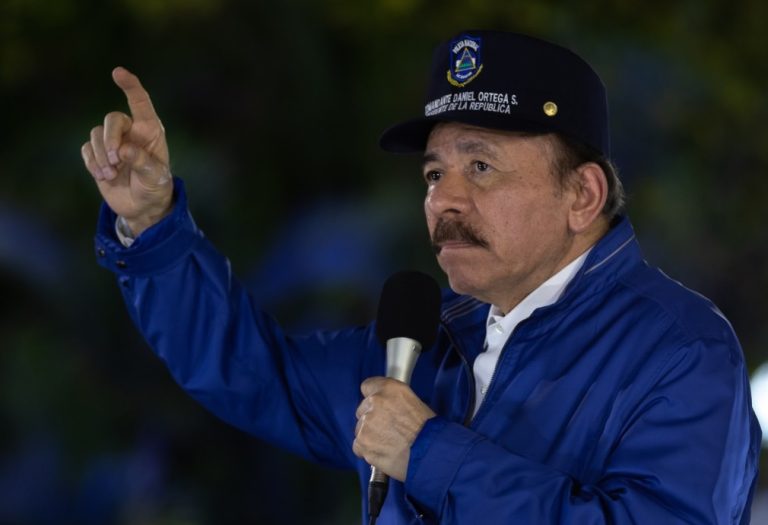22 de octubre 2020

Children of Exile: The Births “Sowing Hope” in the Camp of Nicaraguan Farmers

PUBLICIDAD 1M
PUBLICIDAD 4D
PUBLICIDAD 5D
The Ortega-Murillo regime believes they are geared to promote self-censorship among the population

In an escalation of their fight to silence critical voices
The punitive laws the Daniel Ortega regime is pushing are aimed at frightening the population into censoring themselves. That’s the view of Uriel Pineda, who holds a Masters’ degree in human rights. According to Pineda, they’re also part of the regime’s desire for “fascist style control of the country.”
Pineda is referring to the already approved “Law for the Regulation of Foreign Agents”. Likewise, the “Special Cybercrimes Law”, which could be introduced and approved in the next few days. Thirdly, there’s the law to authorize life sentences, which the regime happily claims has 2.2 million signatures backing it. Many of these same signatures, however, come from state workers, who were obligated to sign the petition.
Human rights specialist Pineda analyzed these aspects during a recent interview on the internet news program Esta Semana. During the interview, he discussed the implications of the three laws for the country.
Essentially, he believes that all three correspond to the regime’s intention to spread fear in the population. For example, they would allow the threat of life imprisonment, and plant fears of surveillance on social media. These, they hope, would prove effective deterrents to activism against those who oppose Daniel Ortega and Rosario Murillo.
Pineda noted an increase in the regime’s actions against the Nicaraguan population and the opposition. Before the April 2018 crisis, Ortega maintained some “concern” for legalities. However, after the citizen protests demanding he leave power, this concern began to evaporate. Eventually, “they [the regime] began to take actions without any legal concerns.”
The regime’s push to authorize life imprisonment, Pineda stated, stems from an interpretation Ortega has created “in his own head”. He’s using this to justify “a very grave sentence for the country.” It represents a regression of more than 70 years in terms of legality and human rights in Nicaragua. It also violates Nicaragua’s international commitments.
Pineda added that the Special Cybercrimes Law, termed the “Gag Law”, seeks nothing more than spreading fear among the population. People will worry that they’re being spied on through the social networks. “What they seek,” Pineda affirmed, “is to inhibit users from criticizing the regime on social media.”
This theory is strengthened by a look at the process for public consultation of the law. On October 17, the Ortega deputies met only with workers from the official propaganda media. For example, there were representatives from television channels 2, 4 and 13, and from the official government website “El 19 digital”. There were also workers from government-allied radio stations such as Radio Ya, Radio Nicaragua, and La Primerisima. According to Liberal party deputy Maximino Rodriguez, those present expressed “concern” about criticisms of Murillo and Ortega on social media.
“It seeks to promote self-censorship, to have people abstain (from criticizing). However, in practice, they’re not going to have the capacity to activate legal mechanisms,” said Pineda. That would signify the regime having to jail “half the population”. They’re not going to be able to do that.
Lastly, Pineda referred to the “Law for the Regulation of Foreign Agents”. This was approved on October 16, during the full session of the National Assembly. All 70 of the Sandinista deputies voted in favor.
Pineda explained that the human rights organizations would be those the new law affects most. The current organizations won’t be able to fund their efforts to follow up on the human rights denunciations they receive. The law will also limit new organizations from registering and “working in favor of human rights”.
The justice system in Nicaragua is completely controlled by the Ortega machine. Given that, Pineda recommended that the organizations and people affected by these laws carry out collective actions instead of complying.
“If just one or a few organizations take action, it will have no effect. But if more organizations join in collective action, the Government won’t have the repressive capacity,” he concluded.
Archivado como:
PUBLICIDAD 3M
Confidencial es un diario digital nicaragüense, de formato multimedia, fundado por Carlos F. Chamorro en junio de 1996. Inició como un semanario impreso y hoy es un medio de referencia regional con información, análisis, entrevistas, perfiles, reportajes e investigaciones sobre Nicaragua, informando desde el exilio por la persecución política de la dictadura de Daniel Ortega y Rosario Murillo.
PUBLICIDAD 3D